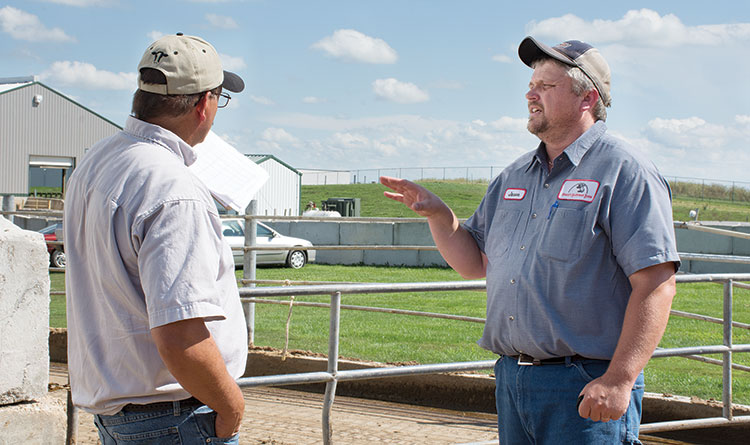
From early on we’re often taught to live by the Golden Rule, “Do unto others, as you would have them do onto you.” It simply means that we should treat people the same way that we would want to be treated. Put another way, you can’t go wrong by treating people with the same respect and kindness we would want reciprocated onto us in our everyday interaction with people. However, when it comes to managing employees, all too often we’re managing them the way “we” would want to be managed. All too often, this is a recipe for failure.
In my 20s, I was working my way through the ranks as a dairy employee. I started as a herdsman, then got a chance to be an operations manager, then became a general manager of a 2,000-cow dairy. As a general manager, I had 20 employees, and quite frankly, I really struggled managing those employees.
Meet employees in their space
Looking back on that situation, I think this took place because I was managing people the way I wanted to be managed rather than listening to the employees and then catering my approach to them based on the clues and selling points they were showing me. For instance, when our breeding program was struggling, I didn’t act assertively enough to step up, lead, and guide the staff in developing an action plan. I sat back and hoped the staff would figure it out.
The reason I took that approach was that I remembered as a herdsman that I didn’t need or want anyone to point out when my breeding numbers were lacking. Had the dairy owner come to me about struggling repro numbers, I would have taken it very personally. It would have only gotten me more frustrated with a situation that I would’ve already been upset about. That was me, however; I was a young brash herdsman with an end goal of being a large dairy manager. I knew my numbers and lived and died by them.
As time went on and I became a general manager, I wouldn’t bring up the struggling numbers or I wouldn’t bring them up assertively enough because I was treating the situation as if I was the one who needed some coaching rather than the staff I had at the time. The herdstaff I was in charge of was made up of four different people who had different backgrounds, came from different countries, and even different generations. While it’s true that they wanted to solve the problem as badly as I did, they all had their own motivations and triggers. Each needed help delivered in a different approach.
If instant replay existed
If the current, gray-haired version of me could go back in time, I would’ve handled the situation very differently. I would have gotten a box of doughnuts, called in the troops, and said, “All right guys, the death loss in the maternity barn looks great. You guys are really doing a bang up job over there.” I then would have continued the positive discussion about the good things going on in maternity to get some smiles going and have the staff smiling and in a positive mood. Then I’d say something like, “All right guys, I need your help on something as our breeding numbers aren’t where they should be. We need to come up with some ideas and a plan.”
I would try and approach it as a problem the team needs to solve, rather than pointing fingers at any one individual. This would have been a solid approach. That’s because the staff I had at the time was passionate about what they did. They put in long days and really cared about the dairy. On the flip side, had I approached the meeting in an accusatory fashion, they would’ve gotten defensive and nothing positive would’ve come from the meeting.
Time away opened my eyes
Ironically, the best thing that ever happened to my skills as a manager was to leave the dairy for four years and take on a sales role with a John Deere dealership. Just like my time as a general manager on a dairy, I started out struggling. I was trying to sell machinery to “me,” rather than being quiet and listening with my two ears.
The data head version of myself was making spreadsheets of fuel economy and charts showing the tax savings of a lease program. However, I never took the time to ask enough questions to know if lease programs and fuel efficiency had anything to do with the customer’s buying decisions.
Fortunately, the owner of the dealership took the time to teach me how to sell. He taught me to ask a thousand questions before making any definitive statements. He taught me to read between the lines of what a person was saying. He taught me that regardless of how crazy someone’s buying motive might be, don’t judge it, just use it to tailor my approach.
A perfect training ground
Fast-forward to my profession as a dairy operations manager many years later. I found my time as a salesperson ended up being the perfect training for managing employees. I had learned that despite what we’re taught, employees don’t all want to be treated in the same fashion.
The guy on the feeding staff working hard to get his life back on track is in a different place than the young herdstaff rock star who wants to prove himself so he can keep climbing the ladder. Those two guys are going to be motivated by different things.
They also want to be shown appreciation in different ways. The rock star on the herdstaff may want to go to a week-long hoof trimming class to add to his skill set so he can keep progressing. He’s going to feel appreciated and motivated knowing that the dairy managers believe in him and share his vision.
The guy feeding cows who’s just working on getting his life back together is probably going to feel appreciated when the dairy managers are flexible with his schedule so he can pick up his kids on visitation days. He may be motivated knowing that he’s working for someone who is willing to take five minutes and sit and listen to the battles he’s fighting outside of work. He may have zero interest in going to a training course but still does a solid job and always shows up on time. It’s up to us to listen and figure out what motivates each individual employee.
We must “sell” to employees
Treating people with the same sort respect we would like to be treated is imperative. Managing employees the way we would want to be managed however, is a setup for failure.
We need to listen to our employees and tailor our approach to each one of them individually. We need to approach employees something like a customer and figure out their motivations and learn what triggers their behaviors. In doing so, we can “sell” them on the idea of following our protocols, procedures, and abiding by our culture, thereby contributing positively to the dairy.










